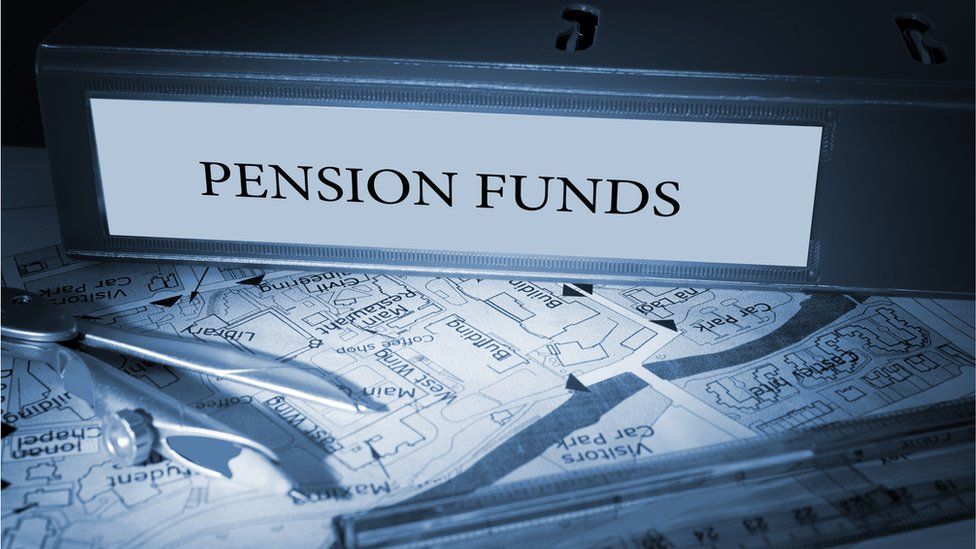BHS exposes 'challenge' of paying our pensions in future
- Published

Stronger rules to protect workplace pension holders and to ensure they are paid in full may be needed in light of BHS's failure, MPs have said.
It was "imperative" that the rules ensured bosses could not avoid their responsibilities to pay pensions, they added.
Experts say current policy could be storing up problems for the future.
BHS's pension scheme had a £571m hole when it collapsed, far higher than the retailer's market value.
"It should not be forgotten that these [pension] liabilities are promises of deferred pay to employees," said the Work and Pensions, and Business, Innovations and Skills committees.
"There may be a case for stronger and more proactive regulation,"
However, the committees' report on BHS added that it was important "a balance" was found to enable otherwise viable companies to continue operating.
Rescue
When BHS fell into administration, its pension scheme automatically fell under the auspices of the Pension Protection Fund (PPF) - the lifeboat for pension schemes.
The PPF ensures people are paid their pension, even when a company goes bust.
To pay for this, compulsory annual levies are charged on all schemes that would be eligible to enter the PPF if needed.
Much debate now surrounds how to keep pension schemes healthy, rather than being a millstone that is ignored or brings businesses down.
The PPF's latest estimate found that 4,995 final salary pension schemes are in deficit, compared with 950 in surplus.
A scheme being in deficit does not mean that it will collapse, as they are long-term investment pools, but it does mean that businesses have to keep a close eye on them.
The collective deficit of UK final-salary schemes is £383bn - a figure which fluctuates but which is displaying a comparatively large deficit at present.
The risk of taking on the pensions burden is thought to be one of the reasons that BHS failed to find backers or buyers for the business as a whole.
MPs said occupational pension schemes were "perhaps the greatest challenge facing long-standing British businesses".
A combination of people living longer, low interest rates and global competition had made it harder for firms to afford their pension liabilities, they said.
'Slow-moving'
The Pensions Regulator (TPR) has a key part to play in ensuring that businesses pay present and future pensioners the amount they have been promised.
However, the committees said the regulator was "reactive and can be slow-moving".
"TPR will increasingly be called upon to make decisions crucial for thousands of employees and pensioners in a fast-moving and uncertain environment. It is essential that it has the powers, resources, leadership and commercial acumen to act decisively," the committees said.
This was echoed by independent pensions consultant John Ralfe, who advised the committees and who criticised TPR's role.
"Underlying pension regulation is weak, confused and opaque, so the Pensions Regulator certainly has a difficult job. But rather than enforcing weak rules in a strong way, the regulator enforces weak rules in a weak way, giving us the worst of all worlds," he said.
"Rather than continuing to muddle through, the government should introduce tougher pension funding standards and the Pensions Regulator should be tough in enforcing them. If not, we are storing up bigger problems for the future."
Lesley Titcomb, chief executive of the Pensions Regulator, said: "We will reflect on the findings of this report and will engage fully with the next phase of the Work and Pensions Committee's enquiries into defined benefit pensions.
"TPR is determined to achieve the best possible outcome for members of the BHS pension scheme and PPF levy payers."
She pointed out that the regulator is investigating the BHS case, and expected to have made "significant progress" by the end of this year.
'Mismatch'
Investment firm Hargreaves Lansdown's head of retirement policy, Tom McPhail, said the MPs' report into BHS's collapse had exposed the tensions between shareholders and the interests of those who would receive a pension payout.
"The possibility of an economic slowdown and increasing inflation could exacerbate an already unsustainable mismatch between the promises made to some scheme members and the ability of sponsoring employers ever to pay for those promises," he said.
Mr McPhail said how best to meet the demands of both sides should be "an urgent priority" for new Pensions Minister Damian Green.
Graham Vidler, of the Pensions and Lifetime Savings Association, which represents pension schemes, said the BHS report concluded that the "massive deficit is ultimately Sir Philip Green's responsibility".
"This sends a welcome and strong message about employers' duties to the millions of defined benefit pension scheme members in the UK," he said.
"It is important to recognise that over the last decade employers have put a record amount of money into DB schemes generally but this has made little impact on funding levels because the challenges facing schemes are complex and varied."
- Published30 May 2016
- Published9 May 2016
- Published25 April 2016